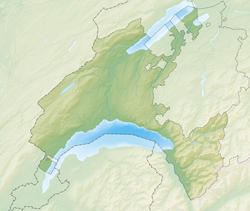Dizy, Switzerland
| Dizy | ||
|---|---|---|

Dizy village
|
||
|
||
| Coordinates: 46°38′N 06°30′E / 46.633°N 6.500°ECoordinates: 46°38′N 06°30′E / 46.633°N 6.500°E | ||
| Country | Switzerland | |
| Canton | Vaud | |
| District | Morges | |
| Government | ||
| • Mayor | Syndic | |
| Area | ||
| • Total | 3.04 km2 (1.17 sq mi) | |
| Elevation | 583 m (1,913 ft) | |
| Population (Dec 2015) | ||
| • Total | 222 | |
| • Density | 73/km2 (190/sq mi) | |
| Postal code | 1304 | |
| SFOS number | 5481 | |
| Surrounded by | Chevilly, Cossonay, La Chaux (Cossonay), La Sarraz, Lussery-Villars | |
| Website |
www Profile (French), SFSO statistics |
|
Dizy is a municipality of the canton of Vaud in Switzerland, located in the district of Morges.
Dizy is first mentioned in 961 as in villa Discidis. In 1041 it was mentioned as Dysi.
Dizy has an area, as of 2009[update], of 3.04 square kilometers (1.17 sq mi). Of this area, 2.16 km2 (0.83 sq mi) or 71.1% is used for agricultural purposes, while 0.71 km2 (0.27 sq mi) or 23.4% is forested. Of the rest of the land, 0.23 km2 (0.089 sq mi) or 7.6% is settled (buildings or roads).
Of the built up area, housing and buildings made up 2.0% and transportation infrastructure made up 2.0%. Power and water infrastructure as well as other special developed areas made up 3.6% of the area Out of the forested land, all of the forested land area is covered with heavy forests. Of the agricultural land, 52.0% is used for growing crops and 18.1% is pastures.
The municipality was part of the Cossonay District until it was dissolved on 31 August 2006, and Dizy became part of the new district of Morges.
The municipality is located on a hill between the Venoge and Veyron rivers. It consists of the linear village of Dizy.
The blazon of the municipal coat of arms is Per pale Azure and Argent, a Saltire counterchanged.
Dizy has a population (as of December 2015[update]) of 222. As of 2008[update], 11.3% of the population are resident foreign nationals. Over the last 10 years (1999–2009 ) the population has changed at a rate of 38.8%. It has changed at a rate of 26.9% due to migration and at a rate of 11.9% due to births and deaths.
...
Wikipedia




